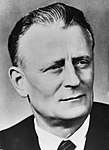| ||||||||||||||||||||||
All 300 seats in the National Assembly | ||||||||||||||||||||||
|---|---|---|---|---|---|---|---|---|---|---|---|---|---|---|---|---|---|---|---|---|---|---|
| Turnout | 99.42% | |||||||||||||||||||||
| ||||||||||||||||||||||
| ||||||||||||||||||||||
Parliamentary elections were held in Czechoslovakia on 14 June 1964, [1] the first since the adoption of a new constitution in July 1960.
Voters were presented with a single list of candidates from the National Front, dominated by the Communist Party of Czechoslovakia (KSČ). [1] According to official figures, 99.4% of eligible voters turned out to vote, and 99.9% of those who voted approved the National Front list. [1] Within the Front, the Communists had a large majority of 217 seats–145 for the main party and 72 for the Slovak branch.
Non-Communist members appeared on the National Front list in order to keep up the appearance of pluralism. However, seats were allocated in accordance with a set percentage, and no party could take part in the political process without KSČ approval. [2]

